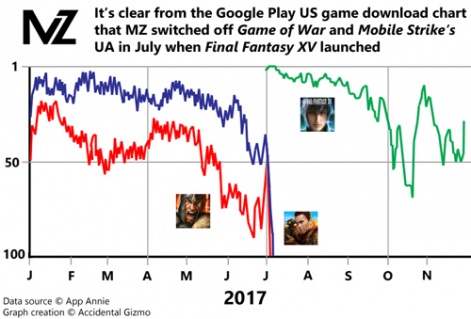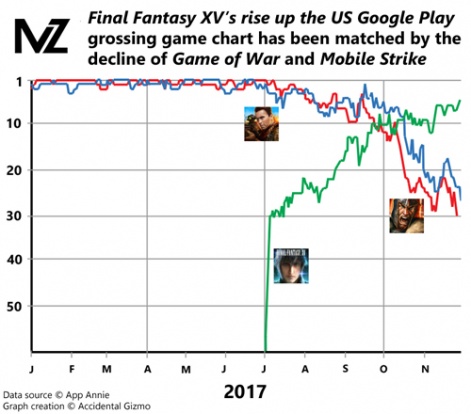Despite being a longstanding admirer of MZ’s business operations, the question that has to be asked is what the hell is going on at the US mobile game developer?
Since 2013 and 2015 respectively its 4X strategy games Game of War and Mobile Strike have sat atop the world’s app stores, each generating an estimated billion dollars annually.
Of course, that sort of success hasn’t come easy or cheaply.
Not even committed players of the games would dispute they are hardcore experiences, heavy on metagame, and aggressive in their alliance-focused monetisation.
For that reason, MZ has been in the vanguard of mobile game marketing, both in terms of absolute spending as well as creative innovation in terms of how and where it spends.
But as a cursory look at the app store charts shows, it looks like those two games have effectively been sunsetted.
Dropping like stones
The download chart is the most revealing; we’re using Google Play as it’s clearer, but the same is true for the Apple App Store.
Thanks to MZ’s continued marketing, both Game of War and Mobile Strike were top 50 games in terms of downloads until the end of June when they dropped like a stone out of the top 100. Indeed, by mid-July both games were outside the top 500.

Given their committed player base, cutting off the supply of new players hasn’t had such a dramatic impact in terms of their top grossing position, but it has had an impact.
From the start of July, the games dropped out of their usual top five position in the US, dropping out of the top 10 during October. If the current trajectory is maintained they could be outside the top 50 by the start of 2018.
Changing of the guards
On one level, the reason for this sudden reversal is obvious. At the end of June, MZ released Final Fantasy XV, its co-production with Square Enix.
The game is very similar to MZ’s previous 4X games, but the appeal of the licence should make a bigger game in terms of player numbers and more efficient on a dollar-to-download level to market.

Not that MZ isn’t spending big to push the game both in terms of in-game UA and wider campaigns, using model and influencer Alexis Ren.
For that reason it’s one of the top 50 most downloaded games on Google Play, but significantly not at the same high level that Mobile Strike experienced prior to the July switch-off.
Every game company on the planet would happily sign a Square Enix-type licensing deal with MZ.
Yet, on that basis, we can see the marketing spend has been more efficient as Final Fantasy XV is now within the top 10 top grossing games on Google Play in the US and continuing to rise towards the top five.
What’s next?
And this is the real reason MZ has taken what appears to be such a radical decision.
Both Game of War and Mobile Strike were very successful, but as they aged, the amount of marketing spend required to keep them at the top of the grossing charts was likely increasing.
No doubt, MZ is a highly profitable company but the difference of spending 30% of turnover on marketing compared to spending say 50% of turnover on marketing is stark in terms of overall profitability.
In that context, it’s a fairly simple calculation to work out how much more profitable it will be to spend less marketing Final Fantasy XV into a top five grossing position, even given the royalty fee paid to Square Enix and a decline in overall revenues.
So, perhaps, what will be more significant to see is what MZ does next.
Given its previous and current success, every traditional game company on the planet would happily sign a Square Enix-type licensing deal with MZ.
It likely has its own homegrown ideas about new games too, although given a chronological release sequence that reads 2013, 2015 and 2017, it may be some time before its intentions are clear.





















